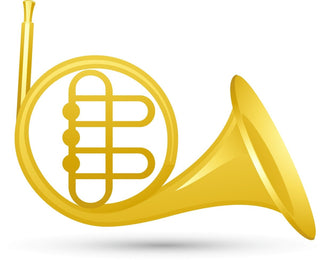All instruments experience natural wear and tear. Regular maintenance such as oiling the valves, greasing the slides and cleaning the horn will help maintain good mechanical condition. However, how do you keep it looking pristine?
First, determine whether your horn is lacquered or unlacquered. A new or freshly polished unlacquered horn can be quite difficult to discern from a lacquered horn. If your horn has been played a lot it’s usually easy to tell. Lacquered horns will still look shiny with fingerprints, while unlacquered horns will dull to a lovely patina as they react with the oils in your skin.

Lacquered instruments:
These horns are easier to keep shiny. You can use a microfiber polishing cloth on a regular basis with no damage to the lacquer. If you need a little extra shine, use a bit of Pledge to get the job done! Take note of any spots on your instrument where the lacquer may be damaged, peeling, or flaking so as not to exacerbate the issue. DO NOT use any abrasive agents on lacquer! It will scratch the finish, which cannot be fixed without stripping and relacquering the entire affected section.

Silver-plated instruments:
Many trumpets are silver-plated. You can use a silver polishing cloth on your horn (and your mouthpiece!) to give it that lustrous shine. Silver plating may wear away, so you don’t need to polish aggressively or excessively. If you start to see darker spots where you’ve polished or where your skin touches the instrument, those are places where the silver plating has worn through.

Unlacquered instruments:
Does your unlacquered instrument need polishing at all? Many brass players allow their unlacquered horns to naturally oxidize, creating a dull patina. Polishing your unlacquered horn repeatedly will eventually wear down the metal. Do not polish more than every few months at the maximum. To help protect the metal you may choose to use leather hand guards (ie. the new Verus Hand Guards) to cover and protect the parts of your instrument that come into contact with your skin the most often.
If you do wish to polish your unlacquered instrument, you’ll need to use a slightly abrasive metal polish such as Flitz. Use a towel or cloth to dab a small amount of the polish onto a section of your instrument. Spread in a circular motion. Once the surface is foggy and the towel is black, use a clean cloth to wipe the residue away. You should be left with a horn that looks shiny and new!


Anonymous
Hi Don, good question! Dennis says Flitz is probably too abrasive for gold plating. He recommends a silver polish like Haggerty’s or Wright’s instead. If you have any concerns about rubbing away the plating, stick with a microfiber polishing cloth and some Pledge.
Joemama101
Ok but like the instrument have I looked horrible water spotting over is all it and instrument of school looks horrible sad I cried 12 hours
Don Leach
How does one care for a gold plated instrument? In my case, a horn.